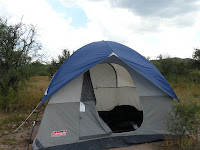 Agua, Comida y Medicina…
Agua, Comida y Medicina…(Water, Food and Medicine...)
Karina, Jenny, and I finished our time at the No More Deaths camp near Arivaca, AZ which is situated nearly 10 miles from the border. Our time there consisted of bringing water, food and medical needs to the migrants in the desert. The work of NMD's and other humanitarian aid groups at the border have had significant impact on those who are in dire need. The experience on those who spend time at the desert camp has also had significant impact on the lives of those with privilege. Many college students and other volunteers come from all over the country to volunteer and learn. It was great to be able to spend time with folks at the camp that were from all over the country. There were folks from Seattle, Colorado, Pennsylvania, South Carolina, North Carolina, Alabama, and others from Arizona. It was a great mix of people who had found their way to the desert from many different places and for many different reasons.
on those who spend time at the desert camp has also had significant impact on the lives of those with privilege. Many college students and other volunteers come from all over the country to volunteer and learn. It was great to be able to spend time with folks at the camp that were from all over the country. There were folks from Seattle, Colorado, Pennsylvania, South Carolina, North Carolina, Alabama, and others from Arizona. It was a great mix of people who had found their way to the desert from many different places and for many different reasons.
We would leave camp at about 7:00am, driving the roads and walk the trails frequently traveled by migrants and return to camp around 11:30am. We would then go out again after lunch around 2:30 and stay out until around 6:00pm. It was an amazing feeling to leave gallons of water at one point and return the next day to find them empty. It's monsoon season, and after a night of a rough storm we walked the trails and left blister kits and socks in a drop box in the hopes that it would help migrants who had injured feet because of walking in wet shoes. We then returned to the same drop box in the afternoon and found that the socks were gone. Although we never encountered the migrants, we know that they took them and hopefully it will help them along their journey.
We left our time in the desert with the feeling that we had helped people in the desert and with a deeper understanding of the migrant journey through the desert. We also left with a re-newed commitment to work for systemic change that will address the root causes for why people make the decision to cross such a vast and dangerous desert and to address the immigration policies and enforcement strategies that do not treat migrants with the basic human rights and dignity they deserve.
(written by Stephanie Dernek)
No comments:
Post a Comment